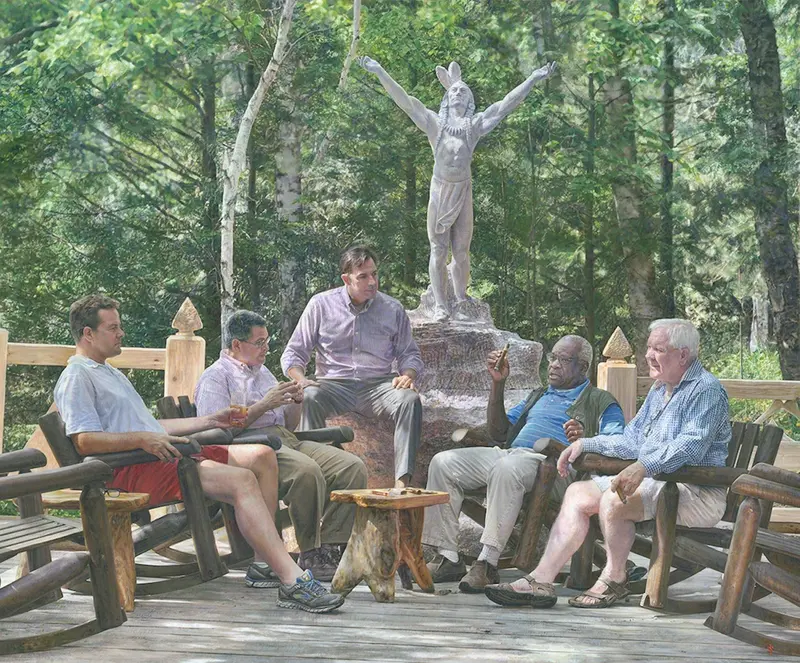Missing Black Women, Migrant Child Labor Win as Topics
On homepage: A painting that hangs at Camp Topridge in upstate New York shows Republican megadonor Harlan Crow, far right, and Supreme Court Justice Thomas, second from right, smoking cigars at the resort. They are joined by lawyers Peter Rutledge, Leonard Leo and Mark Paoletta, from left. ProPublica won the Public Service Pulitzer for “Groundbreaking and ambitious reporting that pierced the thick wall of secrecy surrounding the Supreme Court to reveal how a small group of politically influential billionaires wooed justices with lavish gifts and travel, pushing the Court to adopt its first code of conduct.” (Painting by Sharif Tarabay via ProPublica.)
Support Journal-ismsDonations are tax-deductible.
Missing Black Women, Migrant Child Labor Win as Topics
A community-based investigative reporting team that examined the cases of missing Black women in Chicago joined journalists who reported on gun violence, the Israel-Hamas war, migrant child labor and the lavish gifts bestowed upon Supreme Court Justice Clarence Thomas as winners in the Pulitzer Prizes announced Monday.
There were also honors for film critic Justin Chang, and in a surprise, a posthumous special citation for cultural critic Greg Tate, about whom, an admirer wrote, “His best paragraphs throbbed like a party and chattered like a salon,” as quoted in his New York Times obituary.
In addition, New Yorker contributor Medar de la Cruz won in the “Illustrated Reporting and Commentary” category “for his visually-driven story set” inside New York’s Rikers Island jail, “using bold black-and-white images that humanize the prisoners and staff through their hunger for books,” and Sarah Stillman, also of the New Yorker, was honored in the explanatory writing category for “a searing indictment of our legal system’s reliance on the felony murder charge and its disparate consequences, often devastating for communities of color.”
 ” ‘Missing in Chicago’ is a seven-part investigative series that reveals how Chicago police have routinely violated state law and police procedure, delaying and mishandling missing person cases,” City Bureau explained Monday. City Bureau Senior Reporter Sarah Conway and Invisible Institute Data Director Trina Reynolds-Tyler (pictured, Conway at right) won the prize for Local Reporting.
” ‘Missing in Chicago’ is a seven-part investigative series that reveals how Chicago police have routinely violated state law and police procedure, delaying and mishandling missing person cases,” City Bureau explained Monday. City Bureau Senior Reporter Sarah Conway and Invisible Institute Data Director Trina Reynolds-Tyler (pictured, Conway at right) won the prize for Local Reporting.
“The report revealed a racial bias that disproportionately impacts Black women and girls, and how poor police data is making the problem harder to solve,” the bureau said.
“ ‘Sarah and Trina deserve this recognition for many reasons. The rigor, care and thoughtfulness that they put into this investigation shine through within each piece, and I couldn’t be more proud of their commitment,’ said City Bureau Executive Director Morgan Malone.
“When our reporting is informed by the lived experiences and needs of community, the potential for impact is boundless. I look forward to the change brewing in Chicago and Illinois, due in large part to their incredible reporting, and in the journalism industry at large, as this Pulitzer is proof that investigative journalism driven by community is alive, well and a catalyst for the world we know to be possible.”
With USG Audio, the Invisible Institute also won in the audio category, for “a powerful series that revisits a Chicago hate crime from the 1990s, a fluid amalgam of memoir, community history and journalism.”
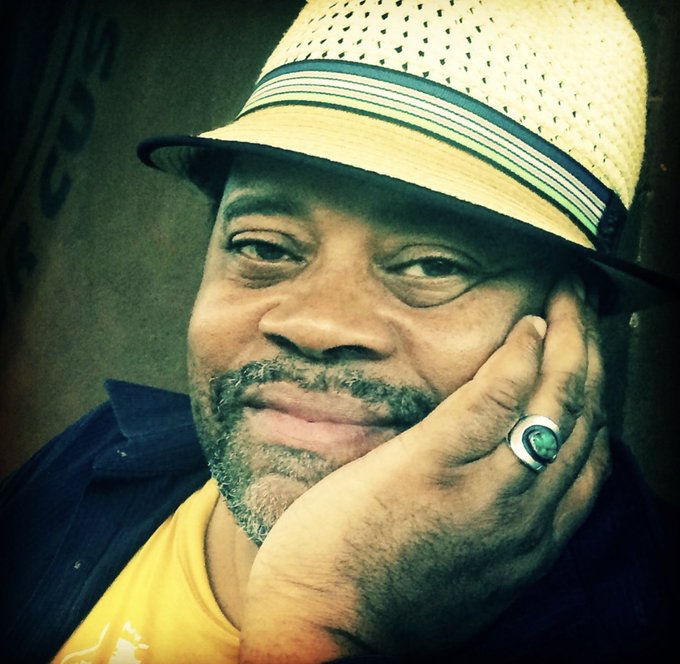 The special citation for Tate (pictured), who died in 2021, said that his “language – cribbed from literature, academia, popular culture and hip-hop – was as influential as the content of his ideas. His aesthetic, innovations and intellectual originality, particularly in his pioneering hip-hip criticism, continue to influence subsequent generations, especially writers and critics of color.'”
The special citation for Tate (pictured), who died in 2021, said that his “language – cribbed from literature, academia, popular culture and hip-hop – was as influential as the content of his ideas. His aesthetic, innovations and intellectual originality, particularly in his pioneering hip-hip criticism, continue to influence subsequent generations, especially writers and critics of color.'”
Asked how the citation came to be, Administrator Marjorie Miller messaged Journal-isms, “We don’t really talk about internal discussions but I can say that from time to time the board has recognized writers and artists whose work had a profound influence on media and culture. Several of the board members were familiar with his work and particularly with his influence on the current generation of critics.”
A second citation recognized “the courageous work of journalists and media workers covering the war in Gaza. Under horrific conditions, an extraordinary number of journalists have died in the effort to tell the stories of Palestinians and others in Gaza. This war has also claimed the lives of poets and writers among the casualties. As the Pulitzer Prizes honor categories of journalism, arts, and letters, we mark the loss of invaluable records of the human experience.”
Despite controversy over some of its reporting, The New York Times won the prize for international reporting for “its wide-ranging and revelatory coverage of Hamas’ lethal attack in southern Israel on October 7, Israel’s intelligence failures and the Israeli military’s sweeping, deadly response in Gaza.”
Angela Fu noted for the Poynter Institute, “The Times’ entry did not include its Dec. 28 report that purported to find a pattern of sexual violence against women during Hamas’ attack on Israel. The controversial investigation, “Screams Without Words: Sexual Violence on Oct. 7,” has faced intense scrutiny from critics who have questioned its accuracy and reporting process.”
The Washington Post was a co-winner for national reporting “For its sobering examination of the AR-15 semi-automatic rifle, which forced readers to reckon with the horrors wrought by the weapon often used for mass shootings in America.”
The Post’s Paul Farhi explained at the time, “In a note accompanying the main article, Executive Editor Sally Buzbee wrote that The Post published the photos because ‘most Americans have no way to understand the full scope of an AR-15’s destructive power or the extent of the trauma inflicted on victims, survivors and first responders when a shooter uses this weapon on people.’ ”
Michael M. Grynbaum wrote for The New York Times, “The prize for investigations went to Hannah Dreier of The Times, for an exposé of migrant child labor in the modern United States, and the governmental blunders and disregard that have allowed the illegal practice to persist. This was the second Pulitzer awarded to Ms. Dreier, who won the 2019 feature writing prize for her coverage of the criminal gang MS-13 for ProPublica.”
Two major wire services received photography prizes. The Associated Press was recognized for images of migrants traveling from Colombia to the southern border of the United States. Reuters won for the photographs it produced, on deadline, of the Hamas attack on Israel on Oct. 7, and the early weeks of Israel’s military campaign in Gaza.
Miller opened Monday’s livestreamed presentation by noting, “these are difficult times for the media and publishing houses, with the loss of more than 130 newspapers and 3,000 journalism jobs last year.” The winning news organizations used the awards to validate their value to a democratic society.
“ProPublica’s investigation last year revealing Supreme Court justices’ beneficial relationships with billionaire donors ignited an impassioned debate about influence and ethics at the nation’s highest court,” Robin Sparkman, president of ProPublica, said in an email. “Today, we learned that this series was awarded the Pulitzer Gold Medal for Public Service, journalism’s highest honor.
“This is ProPublica’s second Gold Medal in our 16 year history and seventh Pulitzer overall. The Gold Medal in Public Service is a unique prize, one that validates our conviction that a functioning democracy depends on investigative journalism to expose abuses of power and breaches of the public trust. As this series shows, with the collective might of our readers and supporters, ProPublica can hold to account the highest echelons of power, expose corruption and spur change.”
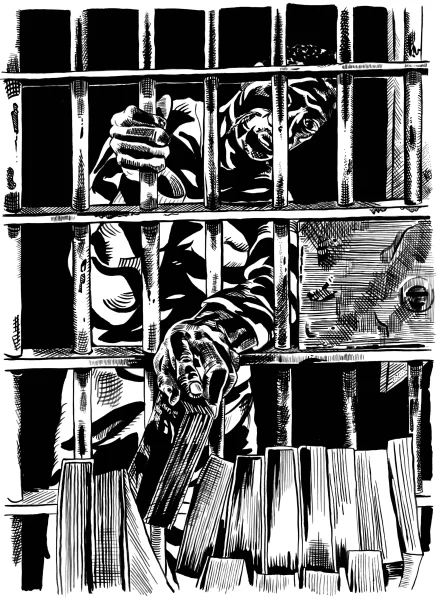
Medar de la Cruz, contributor for The New Yorker, won for “his visually-driven story set inside Rikers Island jail using bold black-and-white images that humanize the prisoners and staff through their hunger for books.”
From The New Yorker, Editor David Remnik messaged, “Late last year, The New Yorker published an extraordinary report by Sarah Stillman on the draconian legal doctrine of felony murder, which has sent thousands of Americans (disproportionately young and Black) to prison for killings they did not commit.
“Today, we received the wonderful news that Sarah has won the Pulitzer Prize for Explanatory Reporting. She was celebrated for the rigor of her reporting, the elegance of her writing, and the meticulous way she shed light on an aspect of our legal system that is known to so few.
“That’s not all. We also learned today that Medar de la Cruz has won the Pulitzer Prize for Illustrated Reporting and Commentary for his remarkable piece on newyorker.com called ‘The Diary of a Rikers Island Library Worker.’ The piece provides an inside look at one of the most notorious jails in the country. The last lines are unforgettable: ‘When I’d finish a shift at Rikers, my legs would be sore from standing all day. I’d think about all the people I’d talked to. I’d hope that I had made some small difference for them. The words of a patron stuck with me: ‘At least you get to go home.’ ‘
 Meg James wrote for the Los Angeles Times that her newspaper convened a Zoom staff meeting to celebrate film critic Chang (pictured) and the contributions of others, even though Chang left the paper last year for the New Yorker. “It’s been my great honor and privilege at the L.A. Times to advocate for the art that I love, and the art that moviegoers in Los Angeles love,” Chang said. “I know critics at other papers and other publications who’ve had to fight tooth and nail to cover the things that really matter to them. That was never a battle that I had to fight for one second at the L.A. Times.”
Meg James wrote for the Los Angeles Times that her newspaper convened a Zoom staff meeting to celebrate film critic Chang (pictured) and the contributions of others, even though Chang left the paper last year for the New Yorker. “It’s been my great honor and privilege at the L.A. Times to advocate for the art that I love, and the art that moviegoers in Los Angeles love,” Chang said. “I know critics at other papers and other publications who’ve had to fight tooth and nail to cover the things that really matter to them. That was never a battle that I had to fight for one second at the L.A. Times.”
Additionally, as The New York Times’ Grynbaum wrote, “In the prizes for arts and letters, the Pulitzer board recognized several works addressing the Black experience in America.
“ ‘King: A Life,’ a biography of the Rev. Dr. Martin Luther King Jr. by Jonathan Eig, shared the award for biography with ‘Master Slave Husband Wife: An Epic Journey From Slavery to Freedom,’ by Ilyon Woo, an account of slaves who escaped Georgia in 1848 and became leading abolitionists in the North. The history prize went to Jacqueline Jones for ‘No Right to an Honest Living: The Struggles of Boston’s Black Workers in the Civil War Era.’ ”
Brandon Som was honored in the poetry category for “Tripas: Poems,” “A collection that deeply engages with the complexities of the poet’s dual Mexican and Chinese heritage, highlighting the dignity of his family’s working lives, creating community rather than conflict,” the Pulitzer judges said.
- Joshua Benton, Nieman Lab: This year’s Pulitzer Prizes were a coming-out party for online media — and a marker of local newspapers’ decline (May 7)
- Jane Clayson with Sarah Conway and Trina Reynolds-Tyler, “Here and Now,” WBUR, Boston: Missing in Chicago’ investigative series wins Pulitzer Prize for local reporting (May 10)
- Tom Jones, Poynter Institute: Poynter Report special edition: The Pulitzer Prizes
- Journal-isms: Pulitzers Illustrate Many Facets of Race, Class (May 28, 2023)
- Journal-isms: ‘Sweet Home’ Alabama? Then, Not So Much (June 8, 2023)
- Journal-isms: Tell It! Report the Story of Systemic Racism — It’s a Must, Say George Floyd Biographers (June 18, 2022)
- Journal-isms: Why Journalists Really Do Matter — To Regain Trust, Pulitzers May Go on the Road (May 26, 2022)
- LatAm Journalism Review via Knight Center: Photojournalists from Chile, Colombia and Mexico among AP’s 2024 Pulitzer-winning team for work on immigration
- Benjamin Mullin, New York Times: How a Tiny Chicago News Organization Won 2 Pulitzers
Kim Godwin Resigns from ABC News
May 5, 2024
‘I Have Decided to Retire From Broadcast Journalism’
Previously:
Poll Raises Question in Light of Election Lies
NABJ Denounces Reporting on ABC’s Kim Godwin
At CBS, George Cheeks Says He’ll Stay the Course
Student Journalists Win Kudos, Support from Pros
More U.S. Blacks Feeling Connected to Palestinians
Anti-DEI Movement Called Another Form of Erasure
Honors for Two Who Photographed the Presidents
Grio Axes M.E., Marc Lamont Hill, Eboni Williams Shows
Dallas Paper Adds Stephen Buckley as Rare Public Editor
$3 Million to Cover the Underreported, Misinformation
Homepage photo: Clutch Points
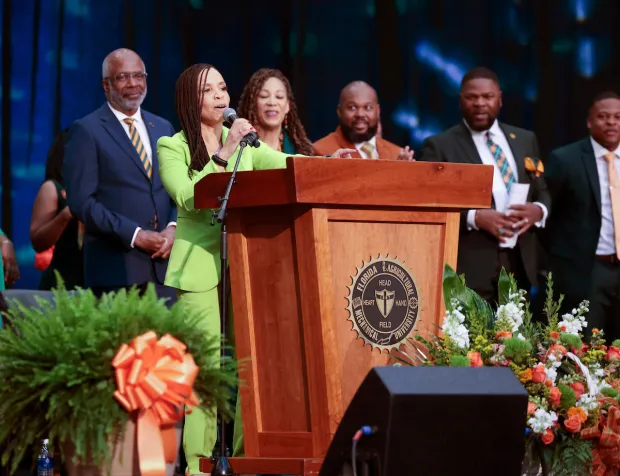
ABC News President Kimberly Godwin, an alumna of Florida A&M University, announces a $1 million grant from Disney, ABC’s parent company, to FAMU’s journalism school during the university’s Homecoming Convocation on Oct. 28, 2022. (Photo: Florida A&M University)
‘I Have Decided to Retire From Broadcast Journalism’
Updated May 6
“ABC News President Kim Godwin stepped down Sunday night, months after a corporate restructuring that effectively stripped away much of her management autonomy,” Joe Flint and Isabella Simonetti reported for The Wall Street Journal.
“I have decided to retire from broadcast journalism,” Godwin said in the email sent to staff Sunday night. “Anyone who’s passionate about what we do knows there’s no other business like it, so this was not an easy or quick decision. But after considerable reflection, I’m certain it’s the right one for me as I look to the future and prioritize what’s most important for me and my family.”
[AJ McDougall, Justin Baragona, Corbin Bolies and Fletcher Peters reported for the Daily Beast Sunday, updated Monday:
[“The announcement comes just days after it was reported that the veteran newswoman told people in a meeting that Black people don’t watch the news, an astonishing claim that first came to light via two reports in Puck and CNN’s Reliable Sources newsletter. Both detailed meetings in which Godwin made the controversial statement and also claimed that the network had overcompensated for a lack of diversity in its newsroom following the death of George Floyd at the hands of Minneapolis cops and the Black Lives Matter protest movement that followed.
[“The reported comments rankled many within the organization — which has a venerable lineup of high-profile Black on-air personalities, including Robin Roberts, Michael Strahan, Byron Pitts, Deborah Roberts, Linsey Davis and Rachel Scott.“
[They also wrote, “But a number of prominent Black journalists both inside and outside ABC either did not respond or declined to comment when reached by The Daily Beast with questions about Godwin’s comments. Notably, none of the network’s high-profile stars, including Michael Strahan and Robin Roberts, stepped up to support her either.”
[However, the Wall Street Journal reported in February, “At a lunch in New York last February,” Disney boss Bob Iger “was pressed by some Black talent at ABC News about what they perceived as unfair treatment of Godwin, who was also in attendance, according to people familiar with the matter. Iger reassured attendees that he and Walden had Godwin’s back and were ‘invested in her success.’ “]
NOTE FROM DEBRA OCONNELL (pictured) TO HER TEAM:
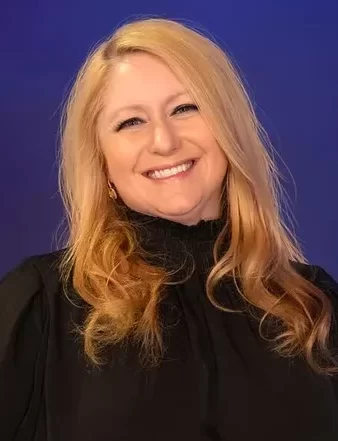 “I wanted to share Kim’s note below. Dana and I would like to take this opportunity to express our deepest gratitude to Kim for her service as president of ABC News. Kim has navigated this team through consequential times in our world, and she did so with respect for the brand and profession – and for that and more, we thank her.
“I wanted to share Kim’s note below. Dana and I would like to take this opportunity to express our deepest gratitude to Kim for her service as president of ABC News. Kim has navigated this team through consequential times in our world, and she did so with respect for the brand and profession – and for that and more, we thank her.
“Our reputation and credibility are hard earned, and we would also like to acknowledge the extraordinary work you deliver each day. As the No. 1 news network for 12 consecutive seasons and counting, ABC News is home to the best in the business. From morning through daytime, evening and beyond, this team stands ready 24/7 to serve our nation with the news, people and events that shape our world.
“For the time being, I will oversee ABC News and I’m looking forward to working with the leadership team as we forge a new path forward together. Thank you for your patience and understanding through this period of transition. Since assuming this role in February, my goal has been – and will continue to be – to provide this team with the means necessary to build on our success and carry on the proud tradition of ABC News into a future full of opportunity and innovation.
“If you have any questions, please don’t hesitate to reach out to me or your senior leaders.
“Thank you,
“Debra”
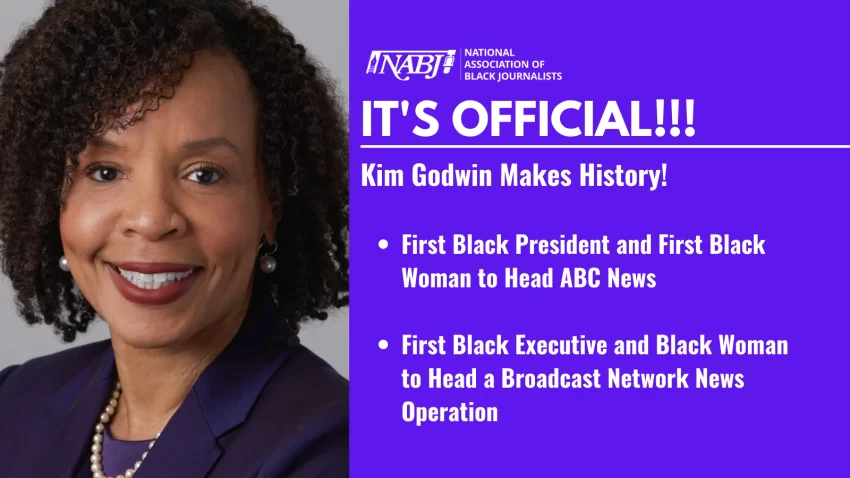
The National Association of Black Journalists was ecstatic when Godwin was named in 2021, and as recently as Saturday spoke out in her defense. It has not responded to a question about whether it knew Godwin was planning to resign when it issued its Saturday statement. (See item below)
KIM GODWIN NOTE TO ABC NEWS:
“Good evening ABC News,
“Forty years ago, I began my career fresh out of college as an eager and enthusiastic executive producer at WTXL in Tallahassee, where I was responsible for the 6 and 11 p.m. news. The staff was so small, on busy news days, I had to go out and report too. Little did I know then what extraordinary opportunities lay before me as I began to chart a path through a profession where very few women – and even fewer women of color – were in leadership roles. So, I understood and appreciated the profound significance of being the first Black woman to lead a national broadcast news network when I accepted the role as president of ABC News a little over three years ago. It’s both a privilege and a debt to those who chipped away at the ceiling before me to lead a team whose brand is synonymous with trust, integrity and a dogged determination to be the best in the business.
“Now, four decades and countless miles later, having worked at all three broadcast news networks and 10 local stations in nine cities, I have come full circle from that small but mighty ABC affiliate in Florida’s panhandle. I have decided to retire from broadcast journalism. After matriculating through j-school at my beloved Florida A&M University, I have been fortunate and blessed enough to have done almost every job there is in this business, including anchor, investigative reporter, news director, field producer, network/special events executive producer and more before moving on to the executive ranks. Anyone who’s passionate about what we do knows there’s no other business like it, so this was not an easy or quick decision. But after considerable reflection, I’m certain it’s the right one for me as I look to the future and prioritize what’s most important for me and my family.
“ABC News was No. 1 when I joined the team and I’m proud to say we’re still No. 1 – an achievement that’s been punctuated in recent months with the highest honors our profession has to offer, from the Edward R. Murrow Award for Overall Excellence in Television, to the Alfred I. duPont-Columbia Award for our groundbreaking “Power of Water” series, to our first-ever Primetime Emmy Award nominations for “Pretty Baby: Brooke Shields” and “Aftershock.” And just last week, our Uvalde documentary, “Print It Black,” won Best Feature Documentary at the Dallas International Film Festival, where it premiered. I am particularly proud of our unprecedented Uvalde 365 project, an unparalleled yearlong commitment to documenting the emotional journey of a community after a mass shooting.
“In 2022, we were all overjoyed to receive 41 Emmy nominations, the most in 53 years. We have the top morning news show, daytime network show, evening newscast and Friday news magazine. We’re consistently No. 1 in all major live TV events, including, most recently, “Eclipse Across America,” in partnership with Nat Geo. And our programs can regularly be found in the Top 10 on Hulu.
“Beyond awards and ratings, our success is perhaps best measured in the people of ABC News. This is an exceptional team doing exceptional work – together. You are best in class in every category, and it’s been nothing short of awesome to see you tackle assignment after assignment, delivering comprehensive coverage from around the world to our viewers at a time when truthful reporting is essential to the future of our great nation.
“We take pride in covering all communities and meeting our audiences where and when they need us, and no undertaking better exemplifies this than ABC News Live. When I started, it was the little streaming train that could; now, thanks to your hard work and dedication, it’s a big train that can – and does, every day. Together, on Hulu last season, we launched “Impact X Nightline,” a weekly news magazine whose episodes are regularly among the most watched content on the platform.
“We should be especially proud of our success with ABC News Studios, which we built from the ground up to become what is now a premiere nonfiction and documentary studio, making more than 120 hours of award-winning content a year. We also established the first climate unit among the broadcast news networks. So many innovations and initiatives in what feels like the blink of an eye. Together, we committed to a cultural shift, where people could be their authentic selves, feeling seen and heard, while doing their best work. For all these reasons and more, I depart ABC News and this profession with the sincerest sense of pride, accomplishment and gratitude. My heart is filled.
“I would like to thank Dana Walden and Debra OConnell for always ensuring we had the resources and support to do our jobs. And finally, thank you ABC News for the love, support and inspiration. Over the years, hundreds of you have sent emails, texts, and made phone calls that have lifted my heart. In this consequential election year, as we look to the months ahead, the importance of what we do cannot be overstated. Remember, there is joy in journalism.
“I leave with my head held high and wish the entire team continued success.
“#oneabcnews
“In faith and favor,
“Kim”
Brian Steinberg added Sunday for Variety, “A Disney spokesperson declined to make executives available for additional comment or to respond to a query about what changes Godwin’s exit might mean for the executive’s immediate direct reports or the management of individual ABC News programs. Godwin’s immediate team includes Stacia Philips Deshishku, ABC News’ executive editor; Derek Medina, an executive vice president who oversees business affairs; and Jose Andino, a vice president who was tasked with organizing specific goals from an ‘Office of the President.’ ”
People of Color Too Trusting of Social Media?
Poll Raises Question in Light of Election Lies
NABJ Denounces Reporting on ABC’s Kim Godwin
At CBS, George Cheeks Says He’ll Stay the Course
Student Journalists Win Kudos, Support from Pros
More U.S. Blacks Feeling Connected to Palestinians
Anti-DEI Movement Called Another Form of Erasure
Honors for Two Who Photographed the Presidents
Grio Axes M.E., Marc Lamont Hill, Eboni Williams Shows
Dallas Paper Adds Stephen Buckley as Rare Public Editor
$3 Million to Cover the Underreported, Misinformation
(More to come)
Homepage photo: In a voter registration drive in 2020 by the Los Angeles nonprofit Our Own, people were able to scan the QR code with their mobile phone to find more information about the ballot propositions. (Credit:Jason Lewis/Los Angeles Standard)
Support Journal-ismsDonations are tax-deductible.
CBS News’ Elaine Quijano interviews Jason Kint, CEO of Digital Content Next, in 2020 about a report detailing an alleged Trump campaign strategy to deter Black Americans from voting in the 2016 election. (Credit: CBS News/YouTube)
Poll Raises Question in Light of Election Lies
“Black, Hispanic and Asian American adults are more likely than white adults to put a great or moderate amount of confidence in election information they receive from social media (38%, 32% and 30% vs. 19%),” the American Press Institute reported Friday.
Separately, “The majority of Black voters in the United States oppose legislation that would ban the social media platform TikTok, new polling found,” the Hill reported.
“The poll, conducted by ClearPath Strategies, found that 51 percent of Black voters oppose a ban of the platform and 55 percent view TikTok favorably. The polling, which is not public, was provided to TikTok from ClearPath through an internal memo, which was obtained by The Hill,” Alex Gangitano reported April 23. “The poll also found that 24 percent of Black voters said they would be less likely to vote for an elected official who supported a TikTok ban.”
The API report, based on a survey it conducted with the Associated Press-NORC Center for Public Affairs Research as part of API’s Media Insight Project, is yet another warning to news organizations about the need to build more confidence in its products among people of color.
Less than two weeks ago, the Pew Research Center reported that white and Asian Americans (78% each) are more likely than Hispanic (61%) and Black (60%) Americans to say press freedom is extremely or very important to society.
Journalists’ best strategy for addressing the disproportionate reliance on social media by people of color is, “Have a plan for engaging on social platforms, and educating audiences how social media may be manipulated,” API said.
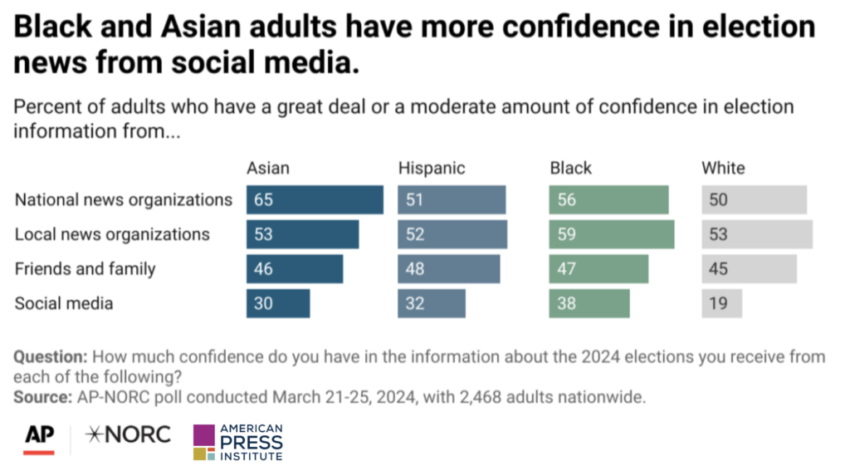
In a piece for API reflecting on the 2020 election, Andrew Rockway made several recommendations for journalists aiming to confront misinformation and disinformation.
They included: “Look beyond the obvious platforms to track misinformation.” “Pay attention to misinformation spreading offline.” “Find ways to make basic voting information accessible.” “Help audiences understand and spot misinformation, and explain where your journalism fits in the information ecosystem.” “Trace the origins of misinformation to help audiences understand how false claims proliferate,” and “Build the skills to understand, track, and cover misinformation for reporters on every beat.”
Rockway wrote, “Taking deeper approaches to misinformation coverage also resonates with audiences. The Detroit Free Press’s election misinformation coverage generated more than half a million page views and 34 direct subscriptions through two paywalled stories.” Arizona State University’s “infomemes reached 660,000 people across Facebook, Instagram and Twitter through organic and paid efforts. The Kansas City Star’s ‘Fact or Fiction: How to Spot Election Disinformation’ event attracted more than 5,000 viewers, with some later subscribing to the paper.
“In other words, efforts to address false information not only served to inform and engage the public but was also good business.”
The Associated Press wrote last month about “the fight against misinformation and disinformation targeting Spanish speakers about elections.” Christine Fernando and Anita Snow reported from Phoenix, “In addition to radio, much of the news and information Latinos consume is audio-based through podcasts or on social media platforms such as Facebook, WhatsApp and YouTube. Content moderation efforts in Spanish are limited on these platforms, which are seeing a rising number of right-wing influencers peddling election falsehoods and QAnon conspiracy theories.
“The types of misinformation overlap with falsehoods readily found in other conservative media and many corners of the internet — conspiracy theories about mail voting, dead people casting ballots, rigged voting machines and threats at polling sites.
“Other narratives are more closely tailored to Latino communities, including false information about immigration, inflation and abortion rights, often exploiting the traumas and fears of specific communities. For example, Spanish speakers who have immigrated from countries with recent histories of authoritarianism, socialism, high inflation and election fraud may be more vulnerable to misinformation about those topics.”
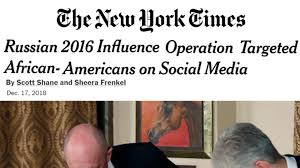 In another follow-up after the 2020 elections, then-Rep. G.K. Butterfield, D-N.C., who chaired the House Administration subcommittee on elections, said the practice of misinforming voters “has been weaponized and targeted at communities of color by racist and antidemocratic actors who seek to intimidate voters of color and discourage them from participating in the democratic process,” Donna M. Owens reported at the time for NBC News.
In another follow-up after the 2020 elections, then-Rep. G.K. Butterfield, D-N.C., who chaired the House Administration subcommittee on elections, said the practice of misinforming voters “has been weaponized and targeted at communities of color by racist and antidemocratic actors who seek to intimidate voters of color and discourage them from participating in the democratic process,” Donna M. Owens reported at the time for NBC News.
Owens continued, “A Senate Intelligence Committee investigation into Russian interference in the 2016 election found that ‘no single group of Americans was targeted by … information operatives more than African-Americans.’
“Tactics that were cited were as varied as the creation of inauthentic social media accounts that posed as Black influencers to a meme that targeted Black and Latino voters on Facebook and Twitter with the message ‘avoid the line — vote from home. Text “Hillary” to 59925.’ ”
- David Bauder, Associated Press: News organizations have trust issues as they gear up to cover another election, a poll finds
- Digital Democracy Institute of the Americas: De(generating) Democracy?: A Look at the Manipulation of AI Tools to Target Latino Communities Online
- Suzanne Gamboa, NBC News: Latino journalist layoffs threaten coverage of disinformation targeting Hispanics (Jan. 26)
- Camila Heins, International Journalists’ Network: To combat disinformation targeting Asian Americans, center language and communities (Jan. 16)
- Jason Lange and David Shepardson, Reuters: Most Americans see TikTok as a Chinese influence tool, Reuters/Ipsos poll finds
- Laura Onyeneho, Houston Defender: Don’t be fooled by fake news: Here’s how to spot it
- Donald M Suggs, Word in Black/St. Louis American: Wake Up, Black Voters. Don’t Let Trump’s Lies Fool You
- Aswad Walker, Houston Defender: What Black Houstonians think about the upcoming 2024 election
- Youth Journalism International: Journalists wrestle with 2024 election coverage
NABJ Denounces Reporting on ABC’s Kim Godwin
Reacting to a continuing stream of anonymous ABC News employees taking published potshots at ABC News President Kim Godwin, the National Association of Black Journalists Saturday defended “the first Black woman to take the helm of a global news organization,” and expressed concern “over recent media reports that seem to be written with the intention of undermining” her.
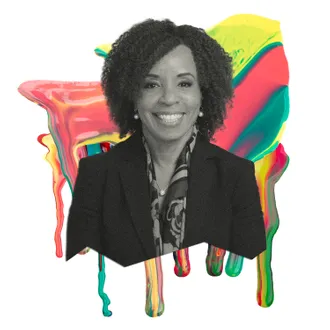 “There seems to be an intentionality to cite anonymous sources as Godwin’s detractors, coupled with the use of derogatory or stereotypical terms to describe her. Meanwhile, these reports are totally ignoring sources and facts that speak to Godwin having significant support inside the organization,” the NABJ statement said. (Photo illustration: The Cut; ABC photo)
“There seems to be an intentionality to cite anonymous sources as Godwin’s detractors, coupled with the use of derogatory or stereotypical terms to describe her. Meanwhile, these reports are totally ignoring sources and facts that speak to Godwin having significant support inside the organization,” the NABJ statement said. (Photo illustration: The Cut; ABC photo)
“Those supporters have told NABJ that they see the attacks, perpetrated through media reports, as ‘racially motivated’ or in reaction to her not being in what some in the industry call the ‘good old boy network’ of players. . . .”
One of the most recent such reports was posted Thursday by CNN media writer Oliver Darcy, who wrote in his “Reliable Sources” column, “Over the last 24 hours I’ve spoken with more than 20 people inside and close to the network, many of whom contacted me on their own volition to candidly share their complaints about Godwin and the era of angst she has ushered in since taking the helm in 2021.
“The newsroom leader, they have told me, has made several profound errors, including her hands-off approach to governing, a lack of strategic vision for the newsroom, the elimination of talent-relations leadership, the appointment of an inner-circle that has alienated staffers, among a stream of other complaints.”
Without naming Darcy, whose quoting of anonymous sources followed similar reporting in the New York Post and Vanity Fair, the journalists association said, “NABJ is extremely disappointed to see such a reckless, unbalanced, and unfair style of reporting, as demonstrated in other stories that do not have alternative viewpoints and, in some cases, have racially insensitive language, unlike a recent Wall Street Journal article. The Journal provided differing viewpoints with more perspective and fairness regarding Godwin’s performance and relationship with staff.”
The Feb. 17 Journal piece, by Joe Flint and Isabella Simonetti, noted that “A few days ago, Godwin found herself at the center of another shake-up: Her contract was renewed, but a new structure was put in place that knocked the news president down a peg in the executive pecking order. Godwin had reported to Dana Walden, the co-chairman of Disney Entertainment who is seen as a potential successor to Chief Executive Bob Iger.
“In a move that effectively layered Godwin, Walden has put Debra OConnell, a Disney veteran of nearly 30 years, over ABC News.”
Flint and Simonetti also wrote, “Now, Godwin has become a polarizing figure inside the network. Detractors say she and her inner circle are stifling discussion and dissent while failing to rise up to challenges facing the unit — including sagging ratings. Several of the ousted veterans were replaced with executives with less hard-news experience.
“Godwin’s supporters counter that as the first Black person to run a broadcast network news division, she is the target of constant second-guessing by a cadre of longtime ABC News staffers who set out to undermine her from day one. . . .”
“Many of the employees who were pushed out last spring were part of a clubby culture at the network, they said, and their management style clashed with the culture of inclusion and collaboration Godwin sought to build.”
At CBS, George Cheeks Says He’ll Stay the Course
George Cheeks, president and CEO at CBS, Monday was named part of a three-person “Office of the CEO” of the parent company, Paramount Global, as the company announced that CEO Bob Bakish was leaving.
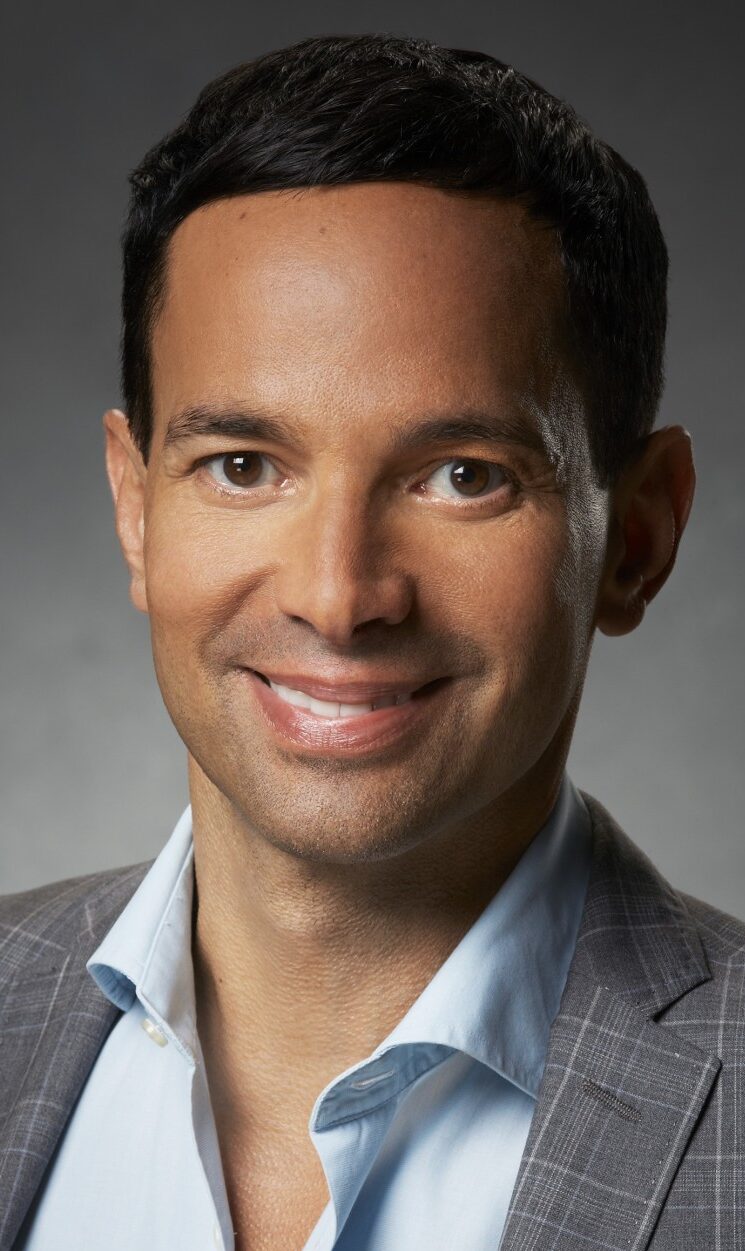 For months, Paramount, which also owns MTV, Nickelodeon and BET, has been in talks about selling the company or merging with another one.
For months, Paramount, which also owns MTV, Nickelodeon and BET, has been in talks about selling the company or merging with another one.
Cheeks (pictured, above), who has been described as biracial, has been a point man for a number of issues of concern to Black journalists.
Cheeks agreed to let Kim Godwin out of her CBS contract in 2021 so she could accept the ABC News presidency, Brian Steinberg reported at the time for Variety.
In 2020, as chairman of the CBS Entertainment Group, Cheeks announced a partnership between CBS TV Studios and the NAACP to develop and produce scripted, unscripted and documentary content for linear and streaming platforms.
The next year, Cheeks met with concerned leaders of the National Association of Black Journalists and later announced the ouster of two powerful TV station executives who were accused of racist and abusive behavior,
Cheeks met with reporters on Thursday, alongside CBS Entertainment president Amy Reisenbach, to unveil CBS’ 2024-2025 TV schedule.
Michael Schneider reported for Variety, “As for how the trio of CEOs are mapping out their ‘long-term strategy’ at a time when the long-term fate of Paramount is unclear, Cheeks added, ‘When you don’t control those things, you strategize for long term. Because we believe that CBS has an incredible amount of momentum right now. And we want to continue and stay that course. We have no idea what could happen, or if the transaction could happen or not. But regardless, we believe so strongly in CBS that we’ll keep doing what we’re doing.’ ”
- Josef Adalian, Vulture: Why CBS Thinks It Can Survive the Streaming Wars (interview with George Cheeks) (March 14)
- Joe Otterson, Variety: CBS Orders Daytime Soap Opera ‘The Gates’ Under NAACP Content Partnership (April 15)
- Rayna Reid Rayford, Essence: CBS Orders New Daytime Drama About Black Family Under Groundbreaking Content Partnership With NAACP (April 24)
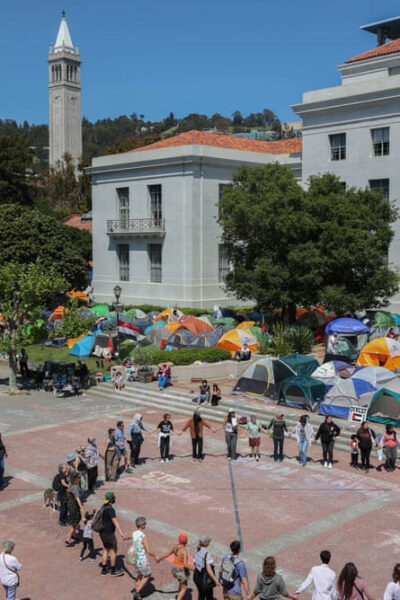
“Nine photojournalists from across the US tell the stories behind their most powerful shots, as pro-Palestinian protesters face police crackdowns,” Gail Fletcher and Julius Constantine Motal wrote Thursday for the Guardian, with text by Erum Salam. Anita Liu of The Daily Californian, University of California, Berkeley, said, “This picture was taken from the balcony of the Martin Luther King Jr student union building, which is directly opposite the encampment. . . . When taking this photo, I knew I was documenting an important moment in campus history. I couldn’t help but think about the parallels between the Free Palestine encampment and the South African apartheid demonstrations on campus back in the 1980s.”
Student Journalists Win Kudos, Support from Pros
Student journalists covering the pro-Palestine protests on college campuses are winning kudos and gaining valuable experience, but the professionals are not always respected by students or the authorities, and some commentators question whether the protests should be receiving more coverage than what is actually happening in Gaza.
“The mention of mass graves is so deeply disturbing that it’s preferable to think of such wartime horrors as dark remnants of another era, chapters of history we’ll never repeat,” Lorraine Ali wrote Monday for the Los Angeles Times. “The Armenian genocide, the Bolshevik revolution, Nazi Germany, El Salvador, Bosnia-Herzegovina.
“The fairy tale that the human race has evolved beyond such barbarism was shattered (again) last week when reports surfaced that three mass burial sites had been unearthed in Gaza. The shocking development should have made headlines, but it barely made it onto most people’s radars.
“The media are instead hyper-focused on how we protest atrocities rather than the atrocities themselves. . . .”
On Thursday, the Pulitzer Prize Board, meeting to decide this year’s winners, to be announced Monday, issued this statement: “As we gather to consider the nation’s finest and most courageous journalism, the Pulitzer Prize Board would like to recognize the tireless efforts of student journalists across our nation’s college campuses, who are covering protests and unrest in the face of great personal and academic risk.
“We would also like to acknowledge the extraordinary real-time reporting of student journalists at Columbia University, where the Pulitzer Prizes are housed, as the New York Police Department was called onto campus on Tuesday night. In the spirit of press freedom, these students worked to document a major national news event under difficult and dangerous circumstances and at risk of arrest.”
Organizations of professional journalists issued statements supporting their student counterparts who have been injured or arrested.
At a meeting of the board of the National Association of Hispanic Journalists Saturday, President Yvette Cabrera credited Ashanti Blaize-Hopkins, president of the Society of Professional Journalists, for spearheading their response.
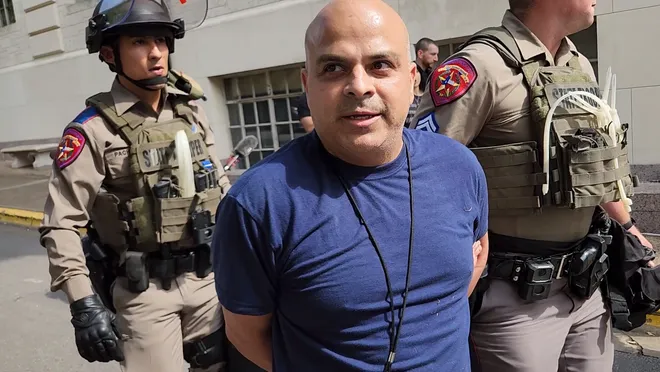
Photojournalist Carlos Sanchez “was performing an important news gathering function during a chaotic event when he inadvertently bumped into a police officer. He did not commit a crime,” Gerry Morris, his defense lawyer, said in a statement. “We look forward to someone taking a unbiased look at the evidence and exonerating Mr. Sanchez. That may ultimately occur with a jury.” (Credit: Skye Siepp/Austin American-Statesman)
Cabrera said NAHJ was particularly concerned about the case of Carlos Sanchez, the photojournalist for KTBC (FOX 7) in Austin, Texas, who was shoved to the ground on April 24 while covering a protest at the University of Texas at Austin. Sanchez was initially charged with criminal trespass, a felony. That charge was dropped, but two new misdemeanor charges have been brought him, according to his defense lawyer, Serena Lin and Tony Plohetski reported Tuesday, updated Wednesday, in the Austin American-Statesman.
On Friday, World Press Freedom Day, the Committee to Protect Journalists said, “This week alone, journalists were arrested or charged for trying to report on the Israel-Gaza war protests sweeping U.S. university campuses. More than 20 have been held or assaulted during protest coverage in recent months.”
The College Media Association, Associated Collegiate Press, Society of Professional Journalists, Student Press Law Center and Foundation for Individual Rights and Expression produced an “open letter to college administrators” [PDF] that declared, “We are horrified and dismayed to see student journalists and their advisers physically attacked, intimidated by police, and unfairly restricted in their access to their own buildings. Each of them is exercising the lessons imparted to them in their classes and student media operations. This maltreatment cannot continue.”
In The Washington Post Wednesday, Laura Wagner reported, “Media access at Columbia University, one of the chief flashpoints, is ‘a little more complex than normal,’ said BBC correspondent Sarah Smith, noting that reporters were having to go through student organizers to authorize interviews, ‘rather than simply being able to wander among them ourselves and speak to who we want.’
“Students are wary. After numerous incidents in which campus activists were doxed and harassed, many are reluctant to have their names or faces exposed via news coverage of the protests that ‘have gained national attention. They are attempting to maintain message discipline, to keep focus on their demands and the ongoing suffering of Palestinians. And they are concerned their protests are not being covered fairly.’ “
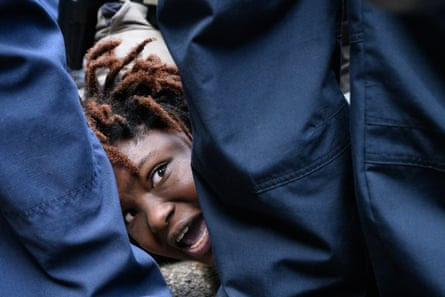
Manoo Sirivelu of The Daily Texan, University of Texas at Austin, told the Guardian, “In this picture, University of Texas police (UTPD) officers are pinning a protester on the concrete sidewalk and zip-tying them. Law enforcement would push in at intervals and surround the protesters, 360 degrees. Nearby crowds and media often couldn’t see the full extent of the force used and how the protesters were being detained. I wanted to show the feelings of imprisonment and suffocation that the students were experiencing, so I tried to depict the officers’ legs as bars that were already surrounding the student.”
Catherine Kim of Politico Magazine was among several journalists who interviewed student editors, photographers and reporters, asking, “What does the media get wrong about the protests on your campus?“
Jacob Wendler of Northwestern University said, “One thing outside media may not see about the protests is that there’s a diverse array of viewpoints within the pro-Palestine encampment, and not everyone agrees on how protesters should carry out their demonstration or what might constitute a sufficient agreement with university administrators.
“The encampment includes Arab and Palestinian students, Jewish students, Muslim students and students of various other identities. They don’t always agree on how to respond to police escalation. For example: During the encampment’s first few hours, tents repeatedly went up and down as demonstrators disagreed over whether or not complying with police orders would be in their best interest, and there’s been dissent within the camp about how much to engage with the media.”
Leon Orlov-Sullivan of City College of New York told Kim, “One thing the media gets majorly wrong is the outside agitator narrative. A lot of the people that I spoke to at the encampment and the protests were CUNY students, and a lot of the older people that I spoke to were alumni or faculty or staff of CUNY. So, I definitely think that one thing the media gets wrong is portraying the encampments as though they’re not really run by or mostly populated by people from the City University of New York.”
- Charles M. Blow, New York Times: The Ghost of the 1968 Antiwar Movement Has Returned (April 24)
- Keith Boykin, Word In Black: What College Protests Say About America
- Democracy Now!: Juan González, Veteran of ’68 Columbia Strike, Condemns University Leaders’ Silence on Gaza Slaughter
- Todd C. Frankel, Washington Post: University endowments show few signs of direct Israel, defense holdings
- Emil Guillermo, Asian American Legal Defense and Education Fund: An Asian American student protester explains why she disobeyed and got arrested
- Chris Hayes, MSNBC: It’s easier to argue about what college kids are doing than to confront the human misery and destruction that’s happening in the actual conflict which is, of course, the source of these protests. (video)
- Angie Jaime, Teen Vogue: 9 Student News Outlets to Follow for Ongoing University Protests Coverage
- Steven Lee Myers and Tiffany Hsu, New York Times: Campus Protests Give Russia, China and Iran Fuel to Exploit U.S. Divide
- Ruben Navarrette Jr., syndicated: Campus protests represent moment of crisis for higher education in America
- Katie Notopoulos, Business Insider: Columbia’s student radio station was the main source of information for the protests. Here’s why that matters
- Clarence Page, Chicago Tribune: Campus protests carry echoes of five decades ago
- Eugene Robinson, Washington Post: A morning with student protesters at George Washington University
- Aswad Walker, Houston Defender: Associate Editor’s Message: What the college protests teach us
Palestinian journalists covering Gaza have been named as laureates of the 2024 UNESCO/Guillermo Cano World Press Freedom Prize, UNESCO reported Thursday, updated Friday. “As humanity, we have a huge debt to their courage and commitment to freedom of expression,” said Mauricio Weibel, chair of UNESCO’s international jury of media professionals. (Credit: Al Jazeera/YouTube)
More U.S. Blacks Feeling Connected to Palestinians
The percentage of Black Americans who feel connected to Palestinians is growing, but a majority say their feelings toward President Biden have not changed since Hamas’ Oct. 7 attack on Israel, according to a poll conducted in March by the Carnegie Endowment for International Peace.
“However, those under thirty years old and Black independents were more likely to report feeling worse about Biden since October 7,” the organization said April 25.
“While two in five (42 percent) Black respondents reported not feeling connected to the plight of either Israelis or Palestinians, the number of Black Americans reporting feeling connected to Palestinians grew a great deal (45 percent, up from 32 percent in our October 2023 survey),” the report said.
Separately:
- “Journalists in Gaza will soon benefit from a new solidarity centre in Khan Younis where they will be able to access electricity, the internet and other equipment. It will also provide a social hub, and space for training and recuperation,” the International Federation of Journalists announced Wednesday. “The solidarity centre will be opened in the coming weeks by the Palestinian Journalists’ Syndicate (PJS) and the International Federation of Journalists (IFJ).”
- “More than 50 tenured journalism professors from top universities have signed a letter calling on the New York Times to address questions about a major investigative report that described a ‘pattern of gender-based violence’ in the Oct. 7 Hamas attacks on Israel,” Laura Wagner reported Monday for The Washington Post. “The letter follows months of criticism and concerns raised by outside critics as well as some Times staffers about the credibility of its sourcing and the editorial process for the story.”
- “As of May 3, 2024, CPJ’s preliminary investigations showed at least 97 journalists and media workers were among the more than 35,000 killed since the war began on October 7 — with more than 34,000 Palestinian deaths in Gaza and the West Bank and 1,200 deaths in Israel,” the Committee to Protect Journalists reported.
The Carnegie report also said:
- “A majority of Black Americans (68 percent) would have liked to see the United States call for an immediate and permanent ceasefire in Gaza, with a plurality (46 percent) strongly supporting the idea.
- “Three in five Black Americans (59 percent) believed U.S. military aid to Israel should be conditioned to ensure that Israel uses American weapons for legitimate self-defense and in a way that is consistent with human rights standards.
- “Our survey suggests that the activism of Black faith leaders has also played a critical role in increasing support from many in the Black community for the United States calling for an immediate ceasefire in Gaza.”
- Gertrude Mwondela, NABJ Black News & Views: Apartheid memories help fuel South Africa’s World Court case against Israel in Gaza conflict (March 15)
- E.R. Shipp, NABJ Black News & Views: ANALYSIS: How Black Americans are caught up in the Israeli-Palestinian conflict (Jan. 10)
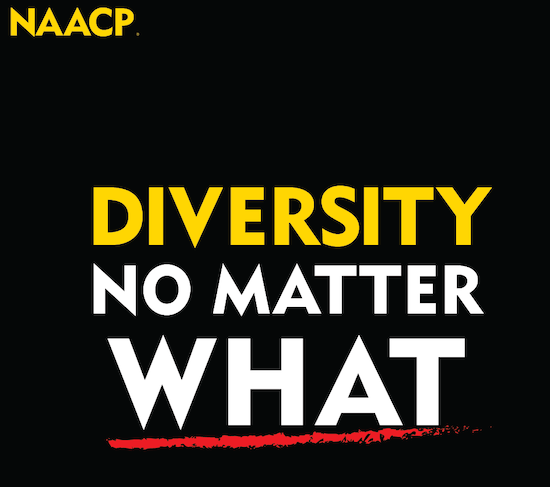
Anti-DEI Movement Called Another Form of Erasure
The NAACP, which was represented at the Journal-isms Roundtable of April 11, “How to counter the increasing moves against diversity, equity and inclusion,” is offering “Diversity No Matter What” stickers at no cost to those who join the organization.
The message: “From racist voting policies, attacks on DEI, and attempts to rewrite Black history — we are facing unprecedented attacks on our community from every direction.
“The NAACP is fighting to ensure that our constitutional rights are protected and our culture respected. This is what standing for community looks like.
“Chip in ANY AMOUNT today and we’ll send you a free sticker for you to show off your support for diversity, equity, and inclusion” >>
 Separately, Tracie Powell (pictured) reported on the Roundtable in a piece for the Pivot Fund posted on LinkedIn, “How the assault on DEI undermines journalism.”
Separately, Tracie Powell (pictured) reported on the Roundtable in a piece for the Pivot Fund posted on LinkedIn, “How the assault on DEI undermines journalism.”
“The implications for journalism are significant,” Powell wrote. “The field desperately needs more journalists who reflect the increasing diversity of the U.S., which is on track to be majority-minority around 2045. Already struggling to diversify their newsrooms, news organizations will lose their main source of young, diverse talent if colleges and universities cave to legal pressure.
” ‘This may just be the tip of the iceberg if advocates find ways to challenge journalism grantmaking designed to address inequity. Clearly, foundations and other deep-pocketed organizations that care about journalism need to step up and confront the assault on DEI in court. In the meantime, publishers can take steps to protect themselves, including diversifying funding sources and strengthening community engagement and support. ‘ “
With the exception of JAWS (Journalism & Women’ Symposium), the journalism associations are still relatively quiet on the issue. But the Joint Center for Political and Economic Studies last week called attention to its op-ed for The Hill, “Congressional staff are still not representative of the people they serve — so why did Congress close its Office of Diversity and Inclusion?“
Vice President Kamala Harris, on a national economic tour, said, “In spite of those who in certain parts of our country want to attack D.E.I., we understand that you can’t truly invest in the strength of our nation if you don’t pay attention to diversity, equity and inclusion.”
Meanwhile, “Civil rights leaders from around the nation gathered in Washington, D.C., Friday to protest book bans and rising attacks on diversity, equity and inclusion (DEI), saying limitations on education were hurting teachers, students and democracy as a whole,” Cheyanne M. Daniels reported for The Hill.
“Protesters with the Freedom to Learn rally marched from the Library of Congress to the Supreme Court. In addition to concerns on book bans and DEI, the rally also highlighted Supreme Court rulings on ending affirmative action in higher education and overturning Roe v. Wade.
“It’s gotten into the business of erasure,” Crenshaw said. “Diversity, equity and inclusion is the new moral panic of the nation. It’s the source, they say, of all that ails us. DEI is becoming the new N-word in American politics.”
“Since 2023, 85 bills in 28 states have been introduced to limit DEI policies, according to the Chronicle of Higher Education. Thirteen have become law, while 14 have final legislative approval.”
A colleague of Eddith A. Dashiell, the Ohio University journalism school director who spoke at the April 11 session, has written about the impact of the revocation of scholarships designated for Indigenous students.
Victoria LaPoe, a professor and a former vice president of the Native American Journalists Association (now Indigenous Journalists Association), wrote in the campus newspaper, The Post, “As we close a semester, I will note that we need to remember history. There are reasons that society needed a Black Press and Indigenous Press. There are reasons why there are organizations such as the Indigenous Journalists Association, National Association of Black Journalists, National Association of Hispanic Journalists, Asian American Journalists Association, South Asian American Journalists Association, The Association of LGBTQ+ Journalists and Trans Journalists Association.”
-
- Aziah Siid, Word In Black: 4 Lawsuits Challenging Book Bans
-
- Sarah D. Wire and Mackenzie Mays, Los Angeles Times: Inside the far-right plan to use civil rights law to disrupt the 2024 election
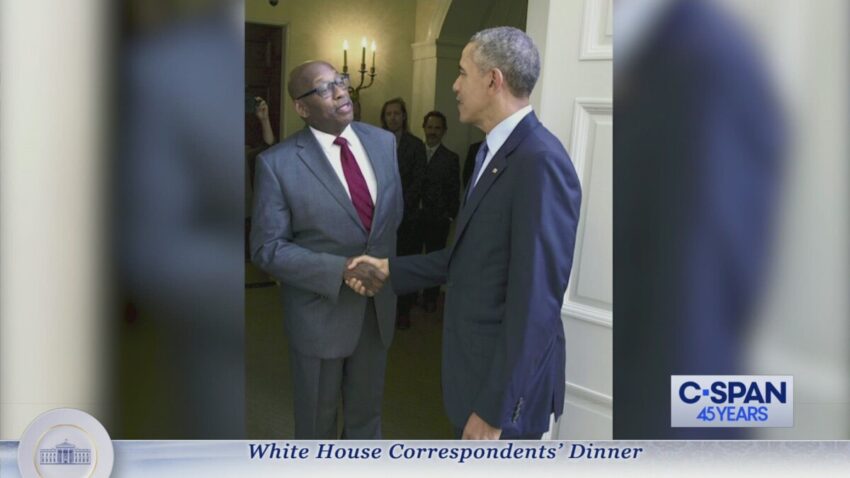
Edward Lewis, former C-SPAN videographer, greets then-President Barack Obama in video shown when Lewis received a lifetime achievement award at the 2024 White House Correspondents’ Association dinner. Kelly O’Donnell, president of the association, said the influence of Lewis and Rodney Batten “extended far beyond their own network teams because of their professionalism, joy on the job and kindness to colleagues.” (Credit: C-SPAN)]
Honors for Two Who Photographed the Presidents
“Two deeply admired and respected veterans of the White House press corps,” Rodney Batten, whose work has spanned nearly five decades at NBC News, and Edward Lewis, who worked for nearly 40 years at C-SPAN and Fox News, were honored with a video presentation April 27 at the 2024 White House Correspondents’ Association dinner.
“They always got their shot, when it counted, again and again,” said Karen Travers, White House correspondent at ABC News, in introducing the video, in which the Black journalists spoke of their work. The segment begins at 53:20 in this video.
The Dunnigan-Payne Prize was created in 2022 to honor the contributions of the first African American women of the White House press corps, Alice Dunnigan and Ethel Payne, “who exhibited persistence, resilience, and tough reporting.”
The journalism awards were chosen by a diverse array of journalists, and $133,000 in grants were awarded to a multicultural group of students from 16 colleges and universities.
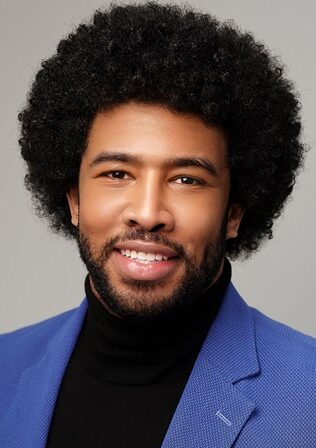 On X, Symone Sanders, former Biden White House senior adviser and current MSNBC host, praised Eugene Daniels of Politico (pictured) for becoming the “first Black openly queer president” of the association, to serve for the 2024-2025 term. The first Black president of the group was Bob Ellison, White House correspondent for the Sheridan Broadcasting Network and association president in president in 1990-91. Ellison covered the Ronald Reagan, George H.W. Bush and Bill Clinton administrations.
On X, Symone Sanders, former Biden White House senior adviser and current MSNBC host, praised Eugene Daniels of Politico (pictured) for becoming the “first Black openly queer president” of the association, to serve for the 2024-2025 term. The first Black president of the group was Bob Ellison, White House correspondent for the Sheridan Broadcasting Network and association president in president in 1990-91. Ellison covered the Ronald Reagan, George H.W. Bush and Bill Clinton administrations.
Roland Martin said the layoffs at Grio TV leave Martin’s own digital program as the only daily one on a Black-owned platform. (Credit: YouTube)
Grio Axes M.E., Marc Lamont Hill, Eboni Williams Shows
“The Grio, Byron Allen’s multiplatform media outlet catering to Black Americans, laid off staffers in a restructuring effort that is also eliminating the managing editor’s position, according to an individual with knowledge of the situation,” Natalie Korach reported Monday for The Wrap.
“ ‘The axe is falling at TheGrio,’ an individual with knowledge of the situation told TheWrap. Members of the podcast and video team have also been laid off along with managing editor Christy Oglesby, the individual said. . . .”
Allen Media Group did not respond to an email from Journal-isms, but Roland Martin reported that shows hosted by Marc Lamont Hill and Eboni Williams would be ending, leaving Martin’s own digital show as the only daily one on a Black-owned platform.
Korach wrote, “Allen Media Group is making strategic changes to better position the company for growth that will result in expense and workforce reductions across all divisions,” the company said in a statement to TheWrap. The spokesperson declined the specific layoffs.”
Dallas Paper Adds Stephen Buckley as Rare Public Editor
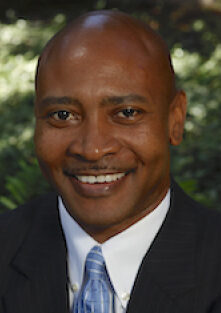 “The Dallas Morning News announced Tuesday that it has hired Stephen Buckley as its public editor,” Tom Jones wrote Wednesday for the Poynter Institute.
“The Dallas Morning News announced Tuesday that it has hired Stephen Buckley as its public editor,” Tom Jones wrote Wednesday for the Poynter Institute.
“Buckley teaches at Duke University, where he is a professor of the practice of journalism and public policy in the Sanford School of Public Policy. He also is the former dean of the Poynter Institute, where he now serves on the board of trustees. Before that, he was a reporter and editor at The Washington Post and Tampa Bay Times.
“In a column announcing the hiring of a new public editor, Morning News publisher and president Grant Moise wrote about how the public’s trust in the media has plunged and added, ‘This reality is deeply troubling to our staff at The Dallas Morning News because we realize that when people don’t trust public institutions and the media (which is intended to hold public institutions accountable), something must change. So, what do you do when trust is missing in a relationship? You address it.’
“Moise then wrote, ‘The more we researched this role, the more we became convinced we wanted to engage an independent public editor to help act as a bridge between the public and our newsroom.’
“On Tuesday, I spoke by phone with Buckley about his new role as public editor.
“ ‘A really bold, counterintuitive move (by the Morning News),’ Buckley told me. ‘And the motivation is exactly right, which is: the most important issue for our industry is reestablishing trust with the public.’ “
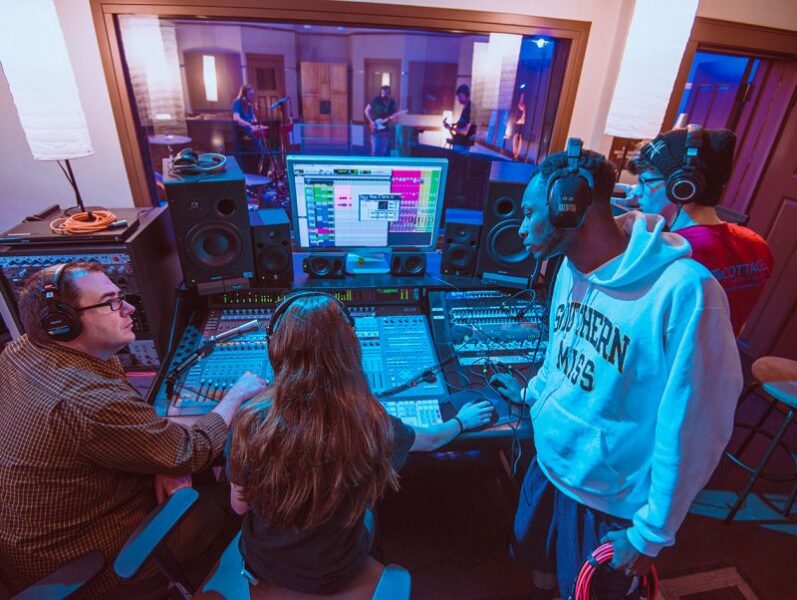
As part of their coverage, students at the University of Southern Mississipi (pictured) “will debunk false information and seek to expose the sources of misinformation for their audiences,” the university said of its Roy Howard Community Journalism Center, to be launched this year. “It also will help students learn how to reach people living in places that no longer have news coverage and might not be eager to trust journalists.”
$3 Million to Cover the Underreported, Misinformation
“The Scripps Howard Fund is investing $3 million to help student journalists learn how to cover under-reported communities while combatting misinformation and providing important journalism,” the Cincinnati-based fund announced Tuesday.
“The Fund selected The University of Southern Mississippi (USM) to host the Roy Howard Community Journalism Center. USM, which plans to launch the center during the 2024-25 academic year, will receive $1 million per year for three years to create and operate the center. . . .”
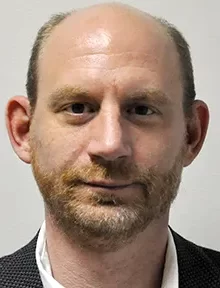 Asked how racially diverse the school expects this student population for this program to be, and how it would you arrive at such an estimate, Edgar Simpson, Ph.D (pictured), director of USM’s School of Media and Communication, replied:
Asked how racially diverse the school expects this student population for this program to be, and how it would you arrive at such an estimate, Edgar Simpson, Ph.D (pictured), director of USM’s School of Media and Communication, replied:
“Scripps, The University of Southern Mississippi and the School of Media and Communication all share diversity as a core value.
“The University tracks the number of students of color, and the school is required to report these numbers for our accreditation by the Association for Education in Journalism and Mass Communication (AEJMC). In our last report, we reported that 36 percent of students in the school were African-American, a slightly higher percentage than the rest of the University.
“To ensure that students of color are informed about and can access the opportunities created by the Scripps grant, we are actively recruiting in high schools with high percentages of students of color and offering scholarships for a dual-credit course specifically designed to lead students to positions in the Roy Howard Community Journalism Center at USM.”
Simpson won the 2022 Diversity in Media History Research Award from the History Division of the Association for Education in Journalism and Mass Communication. Simpson won for the paper, “Spinning Hate: Mississippi’s post-Brown PR Offensive and the Secret Campaign Against “Agitators, 1956-1960.”
(More to come)
To subscribe at no cost, please send an email to journal-isms+subscribe@groups.io and say who you are.
Facebook users: “Like” “Richard Prince’s Journal-isms” on Facebook.
Follow Richard Prince on Twitter @princeeditor
Richard Prince’s Journal-isms originates from Washington. It began in print before most of us knew what the internet was, and it would like to be referred to as a “column.” Any views expressed in the column are those of the person or organization quoted and not those of any other entity. Send tips, comments and concerns to Richard Prince at journal-isms+owner@
View previous columns (after Feb. 13, 2016).
View previous columns (before Feb. 13, 2016)
- Diversity’s Greatest Hits, 2018 (Jan. 4, 2019)
- Book Notes: Is Taking a Knee Really All That? (Dec. 20, 2018)
- Book Notes: Challenging ’45’ and Proudly Telling the Story (Dec. 18, 2018)
- Book Notes: Get Down With the Legends! (Dec. 11, 2018)
- Journalist Richard Prince w/Joe Madison (Sirius XM, April 18, 2018) (podcast)
- Richard Prince (journalist) (Wikipedia entry)
- February 2018 Podcast: Richard “Dick” Prince on the need for newsroom diversity (Gabriel Greschler, Student Press Law Center, Feb. 26, 2018)
- An advocate for diversity in the media is still pressing for representation, (Courtland Milloy, Washington Post, Nov. 28, 2017)
- Morgan Global Journalism Review: Journal-isms Journeys On (Aug. 31, 2017)
- Journal-isms’ Richard Prince Wants Your Ideas (FishbowlDC, Feb. 26, 2016)
- Richard Prince with Charlayne Hunter-Gault, “PBS NewsHour,” “What stagnant diversity means for America’s newsrooms” (Dec. 15, 2015)
- Book Notes: Journalists Follow Their Passions
- Book Notes: Journalists Who Rocked Their World
- Book Notes: Hands Up! Read This!
- Book Notes: New Cosby Bio Looks Like a Best-Seller
- Journo-diversity advocate turns attention to Ezra Klein project (Erik Wemple, Washington Post, March 5, 2014)

